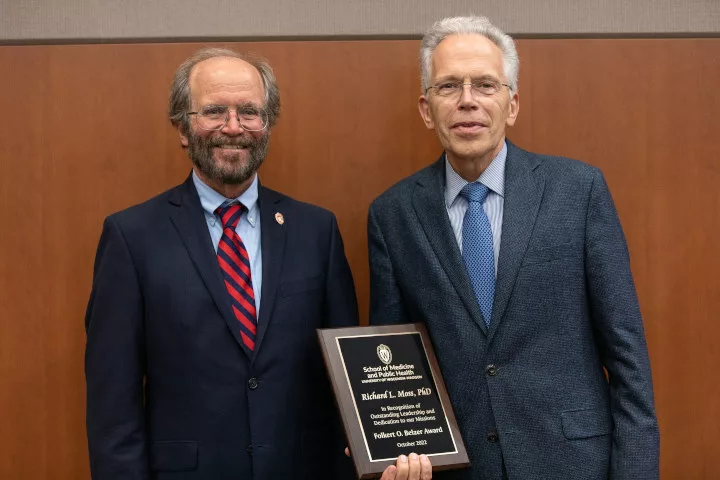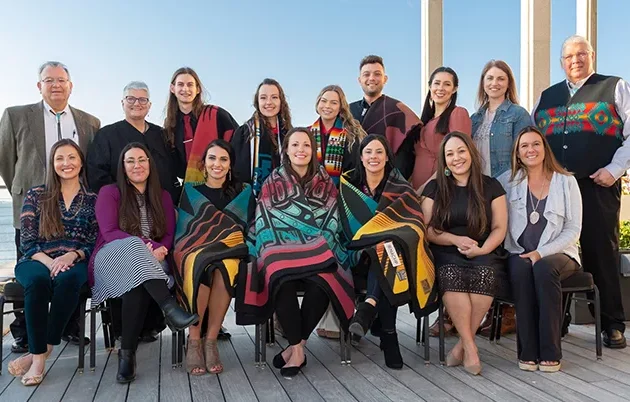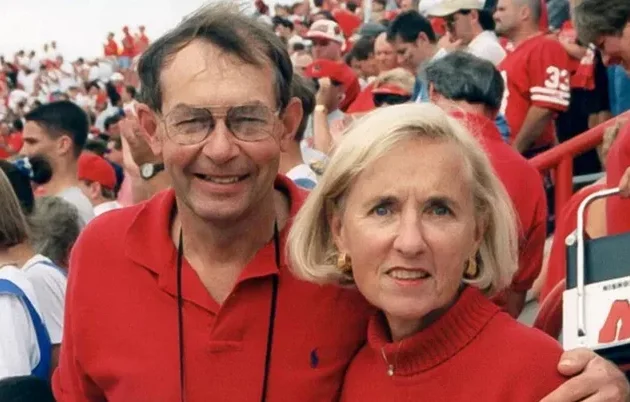While Moss describes his career as “much more than I had envisioned,” he confesses that in 1979, none of it seemed likely. In the year before he arrived, the school’s clinical faculty had moved to the new Clinical Science Center on the west end of campus. Tucked away in the Medical Sciences Center (MSC) on central campus, he found himself amid vacated labs and offices. While there were notable examples of collaboration in the school, the basic sciences were largely isolated. During this time, Moss developed a long, productive research collaboration with Marion Greaser, PhD, professor, UW College of Agricultural and Life Sciences.
Moss is grateful for the mentorship of faculty such as Larry Davis, PhD ’61, professor of physiology; Ford Ballantyne, MD (PG ’72, ’74, ’75), professor of medicine, who invited Moss to co-direct a second-year cardiovascular pathophysiology course; and Harry Karavolas, PhD, a basic science chair who became an informal advisor when Moss became chair of the Department of Physiology. In turn, each demonstrated the importance of collaboration and mentoring.
Today, the basic sciences are co-located with clinical sciences in west-campus facilities designed to foster interdisciplinary collaboration. The school’s research and funding models make up a continuum from basic sciences to clinical and translational research and ultimately to community engagement and public health. Moss can describe these changes in detail because in many instances he helped to mold them.
Meanwhile, his laboratory was thriving. Influenced by his teaching experiences, Moss formed a research team focused on regulation of cardiac contractility. He and Greaser developed novel methods to extract proteins from heart muscle cells to determine the functions of specific proteins in health and disease. The studies identified a myosin-binding protein that mediates regulation of contractility in response to adrenergic inputs and mutations, which can lead to often-fatal hypertrophic cardiomyopathies. Despite initial discouragement by grant reviewers who saw only structural roles for this protein, a dynamic subfield is developing novel therapeutics that address heart failure by targeting regulatory and contractile proteins. Moss’s research has been supported continuously by National Institutes of Health (NIH) grants, including its prestigious Method Extending Research in Time (MERIT) Award, which provides 10 years of funding for research excellence. Golden describes Moss as “the academic equivalent of an Olympic Gold Medalist.”
Moss recognized the benefits of collaboration and diverse perspectives when studying complex biological problems. In this vein, he led the development of NIH program project grants that brought together basic and applied scientists focused on clinically relevant issues. From 1997 to 2018, he was the founding director of the UW Cardiovascular Research Center, which now is led by Hector H. Valdivia, MD, PhD, professor of medicine, and involves more than 130 researchers, physicians and educators dedicated to understanding, preventing and treating cardiac diseases. Moss believes that interdisciplinary centers and institutes at the School of Medicine and Public Health — now numbering more than 20 — are among the school’s greatest assets.
The need for formal interactions among researchers in his field led Moss to organize the first Myofilament Meeting in Madison in 2007. Now a biennial event that attracts more than 160 investigators from the United States, Europe and Japan, it has become the foremost meeting in the field.
“The meeting has been catalytic in terms of collaboration and advancement of early-career investigators,” he says.
Throughout his career at the School of Medicine and Public Health, Moss has led initiatives that have contributed to the school’s statewide impact and rise in national prominence. For example, he is a leader in the Wisconsin Partnership Program, which has played critical roles as the school became the nation’s first integrated school of medicine and public health. As the long-standing chair of the program’s Partnership Education and Research Committee (PERC), he has been involved in awarding competitive grants that have funded a range of research and educational projects led by new and seasoned faculty and by collaborative teams.
In 2002, with Gail Robertson, PhD, professor of neuroscience, Moss envisioned the school’s Master of Science in Biotechnology Program and served as its inaugural director. The workforce-development initiative has been extraordinarily successful in serving the needs of the university and the biotechnology industry. Now, under the leadership of Kurt Zimmerman, senior director of biohealth industry partnerships, the program fosters valuable collaboration in research and development, and educational and community engagement initiatives.
Moss also led the reorganization of basic science departments by research themes rather than traditional disciplines to best support the interdisciplinary nature of research and education.
For Moss—now the emeritus senior associate dean for basic research, biotechnology and graduate studies—slowing down in retirement does not come naturally. Although family, including “three irresistible grandchildren,” has lured him and his wife, Susan, to live in California, Moss still devotes time to work at the School of Medicine and Public Health. He continues to chair the PERC, and he’s helping to develop philanthropic resources aligned with the school’s research priorities. He also collaborates in research with J. Carter Ralphe, MD, professor, Departments of Pediatrics and Medicine, and chief, Division of Pediatric Cardiology.
Since his early days in his MSC lab, Moss often steered waves of change that have led to innovative facilities and research programs with collaboration as a goal. And now, the school’s strategic planning and funding models acknowledge the foundational importance of the full spectrum of research, community engagement and public health priorities. Moss considers it his good fortune to have contributed to these transitions in the school.
In presenting the Belzer Award, Golden expressed profound gratitude for the many ways in which Moss shared his energy, intellect and collegiality in advancing the missions of the School of Medicine and Public Health.


